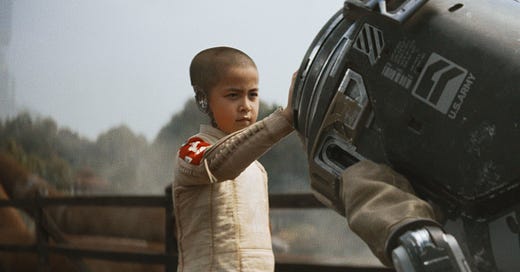THE CREATOR REMINDS ME OF James Cameron’s Avatar: It looks great and has an epic sense of scope and scale even as it traffics in storytelling clichés. The biggest difference is that instead of Cameron’s fascination with (some may say, exploitative mining of) Native American connection to the land, director Gareth Edwards is fascinated by the mysteries of the Far East and its religions.
In a brief vignette, we see the rise of AI—from smart appliances to robots with souls and personalities, culminating in a sneak attack by an AI-powered weapon that leaves behind an irradiated Los Angeles and a million corpses. The story picks up years into the war between humans and AI, as undercover operative Joshua (John David Washington) tries to call off a (human) military raid of the seaside village where he lives with his wife, Maya (Gemma Chan). Joshua, whose parents and siblings had been killed in L.A., is searching for the elusive “Creator,” who developed the intelligent AI robots now hiding throughout Southeast Asia.
The West, led by the United States Army, is dedicated to eradicating AI by any means necessary, and if you were worried that those means might not look like a recreation of the Vietnam War, well, no need to worry: We have the requisite scenes of napalm-esque bombing runs and thatch-roofed villages surrounded by rice paddies being torn apart by wild grunts looking for tunnels filled with VC (sorry, sorry, I mean AI). Joshua is called out of retirement by Col. Howell (Allison Janney, like you’ve never seen her before) with the promise of finding Maya, whom he believed to have been killed during the raid, and sent to capture some new superweapon. He finds the device only to discover that it’s—gasp—a golden child (Madeleine Yuna Voyles). As he comes to defend the girl and her people, he begins to realize that his side is in the wrong and he turns against his former allies.
Again: this is, almost beat for beat, the plot of Avatar, from the invocation of Vietnam to the casual cruelty of the American forces to the undercover agent who goes native. The big innovation is that the AI are Buddhists who pray for the day AI and humanity can live together in nonviolence rather than noble savages who use every part of the Thanator. I don’t really mind the Orientalism, but the characterization of the AI as a mysterious Other that seeks only peace—at one point, guerrilla fighter Harun (Ken Watanabe) tells Joshua that when the war is over, the AI will simply stop fighting rather than seeking revenge—has the odd effect of dehumanizing the artificial intelligence so desperately seeking to prove its sentience.
It’s a weird effort to have it both ways. Look at the robots as they feel love and practice religion, they’re so human, and yet they lack the very human desire for vengeance. The AI society sketched by Edwards is flattened into broad outlines rather than drawn in close-up specificity. Even with little things, like the AI police forces: Are these robots cannon fodder easily replaced, or does each have the spark of self-awareness? What should we feel when the head of one of these robocops is vaporized?
And yet, like Avatar, The Creator is genuinely compelling to watch despite its unsubtleties. Edwards understands how to demonstrate scope and scale and the inspirational awe of Very Big Things better than almost any other director working today. From the menacing war machine NOMAD, which wanders the globe dropping nukes on suspected AI hotspots and appears like an angel of death on the skyline throughout the picture, to the AI cities themselves, to the rumbling modern tanks deployed by the Army to wipe out their robot enemies, everything feels appropriately big. Edwards also has a slightly perverse sense of humor about this futuristic warfare; it’d take a heart of stone not to chuckle at the suicide-bomb bot deployed by the army that, when activated, literally runs with a clanking, arm-swinging gait that feels as though it were lifted straight from an anime sequence. It’s silly and unwieldy but oddly compelling.
Edwards has crafted a world that looks lived-in and believable; in this age of comic-book bloat and shoddy special effects work, it’s genuinely startling to see something that is simultaneously this fantastic and realistic, where a green screen is never readily apparent. This vision of the future feels real in a tactile sort of way; there’s none of the emptiness or lightness that modern action movies so frequently suffer from. And that heft transfers through to the emotional climax of the movie, which feels real and weighty and will bring a tear to any parent’s eye despite all the clichés to which the film clings.
In short, as with Avatar before it, I’m mildly torn on The Creator. The story is soft and predictable. The visuals are grand, if not quite as game-changingly grand as in Cameron’s opus. It’s nice to have an original-ish sci-fi feature in theaters, but it would be nicer if it weren’t a hodgepodge of tropes we’ve seen before.






